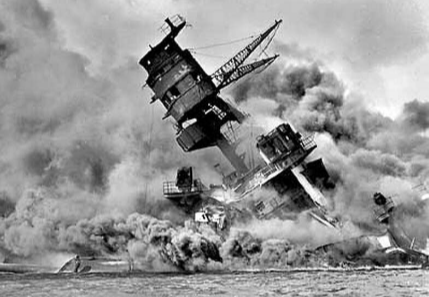List at Least One Reason Why Japan Attacked the United States

You might not realize that Japan’s attack on the United States was not merely a spur-of-the-moment decision but rather a calculated move driven by several complex factors. One significant reason for the attack was Japan’s strategic aim to secure vital resources and expand its economic influence in the Pacific region. By understanding the underlying motivations behind Japan’s actions, one can gain a deeper insight into the complexities of international relations and the lead-up to the events at Pearl Harbor.
Economic Expansionism
Japan’s decision to attack the United States was significantly motivated by a drive for economic expansionism in the Pacific region.
Seeking economic growth and market expansion, Japan aimed to secure access to key resources and establish dominance in the region.
Resource Acquisition
You must consider the critical aspect of resource scarcity when analyzing Japan’s decision to attack the United States.
With a rapidly growing economy and limited natural resources, Japan faced a pressing need to secure additional raw materials for its industries. This drive for resource acquisition was a key factor that influenced Japan’s expansionist policies in the lead-up to World War II.
Read more: Lock Screen: Gavfc1jwifc= Wallpaper
Resource Scarcity
Amidst resource scarcity and the growing need for acquisition, Japan found itself increasingly pressured to secure vital supplies to sustain its economy and military operations.
Resource management and environmental impact were key concerns, as energy consumption rose. Sustainable development became a challenge in balancing economic growth with ecological preservation.
The need for resources to drive industrialization and military expansion ultimately influenced Japan’s decision to seek acquisition through strategic military actions.
Economic Expansion
Facing the imperative of sustaining economic growth and military operations, securing vital resources through strategic military actions became a central focus for Japan during this period.
Economic growth was crucial for Japan’s ambitions, leading to a push for trade expansion and access to key resources. To fuel its economic expansion, Japan sought to acquire territories and resources, driving the decision to attack the United States.
Military Strategy
You should consider Japan’s military strategy during the attack on the United States, focusing on their aim for a strategic naval advantage and their decision to launch a preemptive strike.
Understanding how Japan strategically positioned its naval forces and chose to strike first can provide insights into the motivations behind their decision to attack the United States.
Analyzing these key points sheds light on the calculated military approach Japan took in the context of World War II.
Strategic Naval Advantage
With the aim of securing a strategic naval advantage, Japan initiated its attack on the United States in a calculated military strategy.
By targeting the U.S. Pacific Fleet at Pearl Harbor, Japan sought to cripple American naval power, establishing a military advantage in the Pacific region.
This preemptive strike was intended to prevent U.S. interference in Japan’s expansionist ambitions and ensure dominance in the naval theater.
Preemptive Strike Decision
Amid escalating tensions and strategic calculations, Japan made the decision to launch a preemptive strike against the United States, shaping a bold military strategy aimed at securing its regional interests.
This decision was influenced by meticulous military planning, intelligence gathering, and considerations of strategic defense.
Japan’s preemptive strike was also a response to strained diplomatic relations with the United States, leading to a calculated military action.
Alliance With Axis Powers
The alliance with the Axis Powers, including Germany and Italy, played a significant role in Japan’s decision to attack the United States. This Axis alliance provided Japan with military strategy and support for its imperial expansion plans.
Response to US Embargo
Japan’s response to the US embargo imposed in 1941 had significant implications for its decision to attack the United States.
In the face of US aggression, Japan felt compelled to retaliate due to the severe economic consequences of the embargo.
This retaliation ultimately had a global impact, escalating tensions and leading to the eventual attack on Pearl Harbor in December 1941.
Desire for Regional Dominance
You can understand Japan’s desire for regional dominance by looking at its military strategy for achieving such a position.
Japan’s military expansion was driven by the need to secure key territories and establish control over strategically important regions.
Additionally, Japan sought to acquire economic resources in these areas to strengthen its position in the region.
Military Strategy for Dominance
Seeking to establish dominance in the Asia-Pacific region, Japan meticulously crafted a military strategy aimed at securing its interests and challenging the existing power dynamics.
Through innovative military tactics and leveraging its historical context, Japan aimed to reshape the global implications of power dynamics.
However, the long-term consequences of this strategy led to significant conflicts with other world powers and ultimately contributed to Japan’s isolation and defeat in World War II.
Economic Resources Acquisition
In pursuit of regional dominance, Japan strategically targeted economic resources to bolster its power and influence in the Asia-Pacific region.
By acquiring territories rich in raw materials and seizing control of key industries, Japan aimed to fuel its economic growth and strengthen its resource management capabilities.
This aggressive pursuit of economic resources played a crucial role in Japan’s quest for dominance in the region during that period.
Preemptive Strike
Anticipating potential threats, Japan launched a preemptive strike against the United States on December 7, 1941. This action was driven by strategic considerations related to military defense and international relations.
Revenge for US Interference
Japan’s attack on the United States was driven by a desire for revenge due to perceived American interference in its strategic and economic interests in the Asia-Pacific region. Historical context reveals US intervention in Japan’s affairs, leading to heightened tensions.
The political implications of this interference prompted Japan to seek military retaliation, viewing the US as a threat to its sovereignty and regional influence.
Ideological Differences
Differing ideologies between Japan and the United States exacerbated tensions and played a significant role in Japan’s decision to attack the US.
A cultural clash emerged due to Japan’s nationalistic fervor conflicting with the US’s different political ideology.
Japan’s rigid social hierarchy clashed with America’s more egalitarian values, deepening the divide.
These ideological disparities fueled animosity, ultimately contributing to Japan’s aggressive actions against the United States.
Strategic Positioning
With strategic positioning playing a crucial role in military planning and decision-making, Japan carefully assessed its geographical advantages and vulnerabilities in relation to the United States before initiating hostilities.
The geopolitical implications of securing regional influence and naval dominance were paramount. Japan’s focus on military logistics further highlighted the necessity of a proactive approach to ensure a strategic advantage in the Pacific theater during World War II.
Conclusion
In conclusion, Japan’s attack on the United States was driven by a complex web of economic, strategic, and ideological factors. The pursuit of economic expansionism, resource acquisition, and military strategy played a crucial role in the decision to launch a preemptive strike.
However, revenge for US interference, alliance with Axis powers, and ideological differences also contributed to the escalating tensions. Ultimately, the attack on Pearl Harbor serves as a cautionary tale of the consequences of unchecked aggression and power dynamics in international relations.



